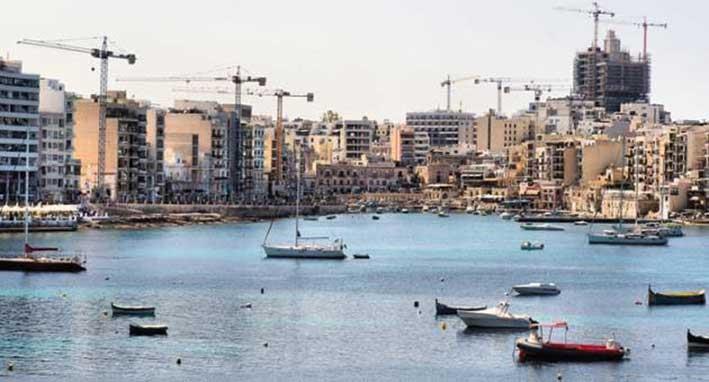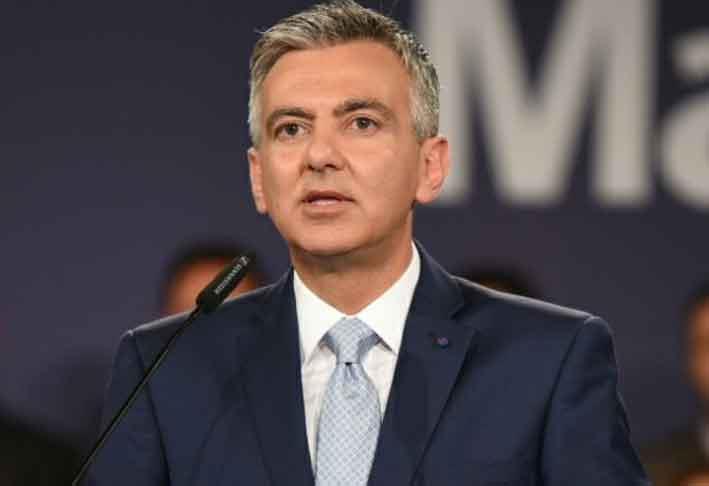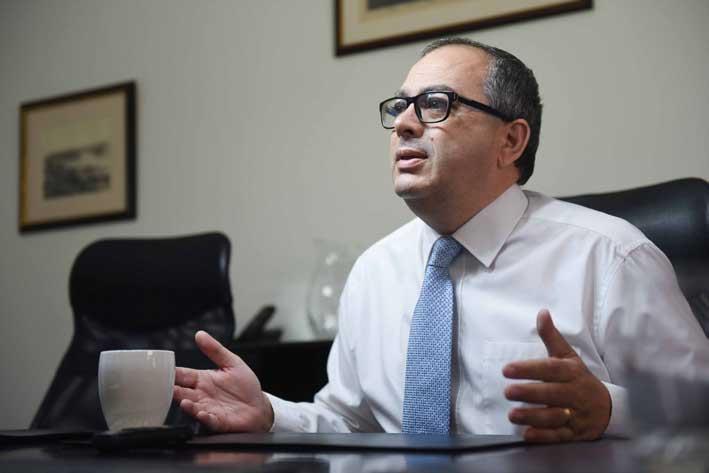PN Leadership contender Alex Perici Calascione stressed the need to strike a balance when it comes to development arguing that Malta is not Dubai, during an interview with The Malta Independent on Sunday.
The PN candidate was also asked about his position on private sector ODZ development, bearing in mind the recent approval of the application for a home for the elderly in Naxxar on ODZ land, and the Zonqor AUM project.
He said: "As far as ODZ is concerned, ODZ means ODZ. The only exceptions would need to be for something of clear public importance or need. If someone tells me the airport needs to be enlarged to service more aircraft coming to the island, for example, that would be one thing. We made mistakes in the past when we were in government, mistakes that we still see today, and the PL has continued to make these mistakes. ODZ is not an elastic band that stretches or goes into place depending on how interesting one private project or the other is. ODZ should be set in stone with clearly defined exceptions.
"My concern is less about the nature of one or two developments and more as to whether this is part of some larger plan for over-development. We have heard talk of making Malta more like the Dubai concept. I am against this. This does not mean I am against development - far from it - but this is our country and we need to do our best to ensure that what is left is intact for those who come after us. I don't believe one should be purely in favour of the environment or in favour of development: it is not like that and never was like that. We should re-establish a balance.
"Balance is re-established through serious and clear governance, though a sense of national pride - which even the developer should feel - and through a sense of what is important for the economy - which even an environmentalist should feel. It used to be like that and there is no reason why we should not re-establish it. We need to do this as soon as possible."

What do you make of the concept of building up rather than building out, keeping in mind the problematic traffic situation in Sliema, St Julian's and Gzira?
"Merely saying that we should build up in order not to build out is a bit of an over-simplification and might be a simplistic justification. We need to look at the large numbers of empty and disused dwellings. There are areas where one can redesign and conceive anew even within built up areas.
"This is where we should look first. Simply saying 'if you don't want me to build out then I'll build up...' one thing does not have to mean the other. It is wrong for us to feel that we must accept building up as the price for not building out. Looking at the situation in terms of extremes - developing or not developing - is not correct. There is a balance to be found. At the same time, there are the demands of the economy and there could be a situation where the supply is not enough.
"We have spoken in the past about good governance, which remains a concern, but I would add another concept, that of wise governance. This is what we need government to do. As citizens, we all need to have the peace of mind from knowing that the government is there to take the best decisions for everyone. It might look simplistic, but in reality this is the biggest challenge. Good governance is technical; you should impose it and there are no two questions about it. Wise governance comes from seeing the wider, long-term perspective. It is a demand in all governance sectors, but as far as development is concerned, and in the context of a small island where we have, unlike Dubai, heritage, history and quality of life, we do not need to invent something in the middle of a desert.
Dubai did what they had to do in its context and it is a success story. But you can't export it and superimpose it in a different context.

Did you consult Simon Busuttil before you submitted your nomination for the leadership position?
No, I did not consult Simon Busuttil, but I spoke to a number of people who had approached me and who suggested that I give it due consideration.
Did you consult with anyone who forms part of the current party leadership?
No I did not, as I wanted to have as independent an opinion as possible.
Should you be elected, do you have anyone in mind for the posts within your team?
No, and this is something I feel strongly about. When we conducted major reforms back in Louis Galea's time, they were done with the intent of separating and balancing out power within the party to ensure it would not all be concentrated in one person. Therefore today, as our current statute reads, there is a set procedure.
Deputy Leaders are chosen in the same way that leaders are chosen, and other officials are chosen by the party organs. That is a choice left to those who have the right to vote for those positions. I will not and have not sought to form such alliances beforehand as I believe that it would be detrimental to the well-being of the party.

Are you the candidate of the current PN establishment?
I previously said that none of the candidates are to be perceived as Simon Busuttil's candidates, as we are all candidates of the party. Simon Busuttil has been clear: he wants to ensure that there is as fair and transparent a process as possible. All of us are and none of us are Simon Busuttil's candidates, as we are candidates of the party.
I do take some exception to the term 'establishment', in the sense that it is abused as an expression. Three of us have been directly involved with the party for a number of years. In Adrian's (Delia) case, although not involved directly, he is supported by people who have been involved in the party for a number of years. So one can say there is a bit of establishment and a bit of 'new' in all of us. I don't believe there is any one candidate who can say that he belongs to the establishment.
The perception, through reading the comments boards and speaking with people in the street, is that all four PN Leadership candidates are seen as weak, as not having the right qualities required to contest a general election and win. How would you, if elected, address this perception?
From the response I am getting - from the councillors I have met as well as through the various district and committee meetings, from the party organs - this is really not the perception I am hearing about. The people who will vote (in this leadership contest) are those who have the party at heart, who have been working in the party structures, people who come to their own conclusions based on what they feel is the right decision to take. That is not the perception, beyond what people are saying in the media, I am feeling from within the party:

Do you believe the public at large has this feeling?
I wouldn't say there is that feeling. People have asked why others have not stepped forward. It is true only four have done so, and there have been questions as to whether others should but, then again, everyone has their own personal choices to make.
I would not subject this judgement on any of the four candidates based on the reasons why other people have not come forward to contest. We are going through an election campaign period and I am sure there are certain things known about the candidates and others that still need to be discovered. I suppose that at the end of the day the full picture of whether a candidate is worth considering or not will be drawn towards the end of the campaign.
If you are elected Leader and if you are eventually elected Prime Minister, will you ensure that there will be no scandals which would put the party under the microscope?
I don't think anyone, either in politics or in life in general, can ever ensure that no scandal will crop up. As long as there are human beings in the picture, corruption and scandal seem to unfortunately be inevitable. What I can definitely undertake, and this in a determined manner, is that I will not allow a situation in which one would feel that it is ok for a scandal or something improper to happen, and I would take immediate action should this occur.
There are certain things one can control and others that one cannot. The important thing is that, if they do happen, you will not have encouraged them to happen before and will take immediate action after.

The PN seems to have more vocal liberal and conservative elements, while these same elements within the PL seem to be unified under one leader. How would you bring these parts together?
My own assessment of the Labour Party situation is that it is less a matter of being unified under one leader, and more a matter of being suppressed for the greater good. With regard to the Nationalist Party, our values and principles find their inspiration in Christian values and principles. This is written in the party's statute. Those same values and principles apply to a party that has to create policies for everyone, irrespective of religious belief. The PN believes in placing the individual at the centre of its policy, irrespective of religion, race or sexual orientation, etc.
Those same principles in themselves spur debate, and that is what I want. God forbid that the PN remains some homogeneous or unified body where everyone thinks and speaks the same, suppressing any form of debate. That is not what the PN is about and it will not be like that under my leadership. The same values and principles that encourage debate, even heated discussions, at the end of the day should provide the framework within which you will find convergence. One of the main tasks of the party leader will be to encourage debate and, at the end of the day, strive towards convergence.

High rents and low interest rates are really hitting peoples' pockets. What would you recommend to mitigate these problems and help the Maltese public?
The situation we have today is a result of this government's economic philosophy. We have a situation where, increasingly, our traditional middle-class is being transformed. We have a section of this class which has shot up. There are areas in the economy doing well and, as a result, the upper-section today joins the high-earners. At the same time, a considerable chunk of that middle class which has always lived comfortably without excessive preoccupation as to their standard of living, today faces challenges that it has never faced before, such as keeping up this standard of living in the face of increasing rents and prices (of food and medication, for example).
It is surprising that this happened under a traditionally left-leaning government. We must work towards an economy which works for everyone. Here, I am talking about medium and long-term planning. It is undeniable that the short-term effects of today's government's economic policies are there for all to see: tomorrow does come. We must think, from now, of new areas of economic activity which cover where we will be in 10 years' time. We have always had to reinvent the wheel in phases. This is what I fear has been missing over the past four years and from what we can see, unless something is announced, it will be the same pattern for the years to come. One such sector, as an example would be Fintech.